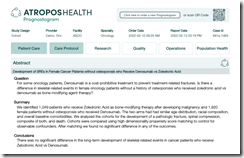Healthcare AI News 7/24/24
News

Mayo Clinic will implement an ambient nursing documentation system from Abridge that integrates with Epic’s nursing workflows. Mayo, which is participating in the technology’s development, hopes to have nurses using the tool by the end of the year.
OpenAI creates compliance and administrative tools for enterprise users of ChatGPT who work in heavily regulated industries such as healthcare, legal services, and finance. The API sends time-stamped user records to EDiscovery and Data Loss Prevention service providers to support archiving, audit trails, data redaction and retention, and policy enforcement. A key use case is HIPAA compliance related to detecting and deleting protected health information. The company will also roll out a system this week that syncs employee directories with ChatGPT to provision and de-provision user accounts.

Sound Health announces Sonu, a $299, FDA-authorized, AI-powered wearable that analyzes the user’s sinuses and delivers acoustic waves that stimulate nasal vasoconstriction to treat rhinitis congestion.
Business

Drug design technology vendor Insilico Medicine announces DORA, an AI-powered system for researchers that summarizes relevant published literature and then uses the researcher’s hypothesis to create a draft article with citations.
Drug maker Takeda will use AI models from Nference to identify patients who could benefit from advanced interventions for inflammatory bowel disease.
Microsoft will collaborate with Mass General Brigham and UW Health to develop Azure-powered medical imaging models that will extend Nuance’s imaging copilot applications.
B. Well Connected Health adds configurable AI architecture to its FHIR-based platform to support network access, health data summaries and queries, and a consumer cost-saving recommendations engine.
Meta announces the open source Llama 3.1, which it says is being used for drug discovery, personalized medicine, clinical trials administration, and creating voice and vision ambient medical documentation.
Research
Researchers raise concerns about using AI in medical publishing:
- Real-world validity and clinical relevance needs to be improved and measured.
- The “publish or perish” model may tempt researchers into writing low-quality and misleading articles that are already common in some environments, countries, and settings.
- AI-created programming might increase errors when used by less-expert people.
- AI can generate plausible but incorrect medical articles.
- Future scientists may be hampered by homogenized articles, an increased number of published papers, and validity issues.
Other
HHS creates new positions for CTO, chief artificial intelligence officer, and chief data officer.
Hospitalist and AI-powered oxygen therapy platform company CEO Julio La Torre, MD, MBA says that output from always-on vital signs monitors is an untapped resource. He says that monitoring could make rounding and intermittent data capture obsolete and provide value to researchers. He notes challenges – data collection and standards, the need for robust security, developing the hospital infrastructure to integrate monitor data with existing systems, and developing a sustainable business model.
Contacts
Mr. H, Lorre, Jenn, Dr. Jayne.
Get HIStalk updates.
Send news or rumors.
Contact us.













































































I've figured it out. At first I was confused but now all is clear. You see, we ARE running the…